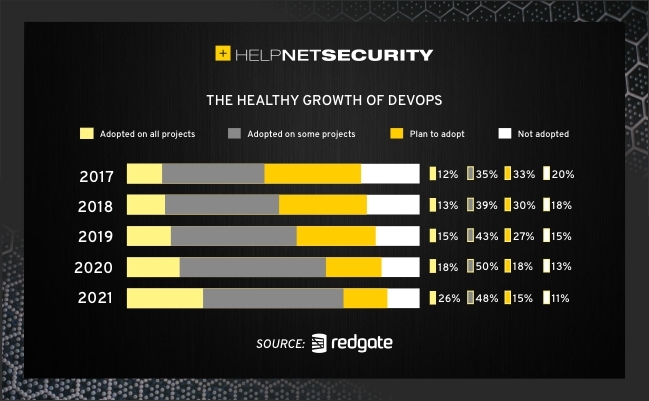73% of healthcare organizations have now adopted DevOps
The last year was challenging for every business sector, and none more than healthcare which was under enormous pressure to provide care while changing the way many services are delivered.

According to data from a Redgate Software report, the importance of IT in enabling and facilitating that change has been key to success for the healthcare sector, with DevOps adoption, cloud use and cross-platform database development all increasing markedly.
The survey of over 3,000 IT professionals from every industry sector in the US, Europe and the Asia Pacific provides a deeper dive into the differences and similarities that exist across and between industry sectors, with fascinating insights emerging for those in healthcare.
DevOps adoption in healthcare is up
For example, 73% of those in healthcare have now adopted DevOps, which is up from 70% in 2019 and a dramatic difference to 2017 when the average take-up across all sectors was just 47%.
Cloud adoption in healthcare also saw a sharp increase, rising from 42% in 2020 to 55% in 2021. This is tempered for the coming year when the rate of growth is expected to fall back, with only 42% of those in healthcare expecting a further increase compared to 50% across other sectors.
The research also uncovered emerging differences from IT teams in the healthcare sector who are introducing a DevOps approach as part of their digital transformation initiatives when compared with other sectors.
While they are slightly behind the curve in their use of DevOps practices like version control and the automation of builds, testing and deployments, for example, healthcare IT is more assured when it comes to database development.
More frequent database changes deployment
51% of respondents deploy database changes once a week or more frequently, compared to 47% across other sectors, yet the percentage requiring hotfixes is the same as other sectors, demonstrating that speed is not at the cost of efficiency.
The confidence is reflected in other areas of the report as well. Like all sectors, increasing the speed of delivery of databases changes and freeing up developer time for more added-value work are the top drivers for introducing automation and other DevOps approaches to database development.
Reducing the risk of losing data during deployments is less of a concern, however, as is protecting business-critical data when integrating database changes into a DevOps process.
Similarly, 31% of those across all sectors regard the complexity of the database as the biggest challenge when introducing continuous delivery for database changes. This falls to 26% in healthcare, whereas meeting regulatory and compliance requirements is at 13%, four percentage points ahead of other sectors.